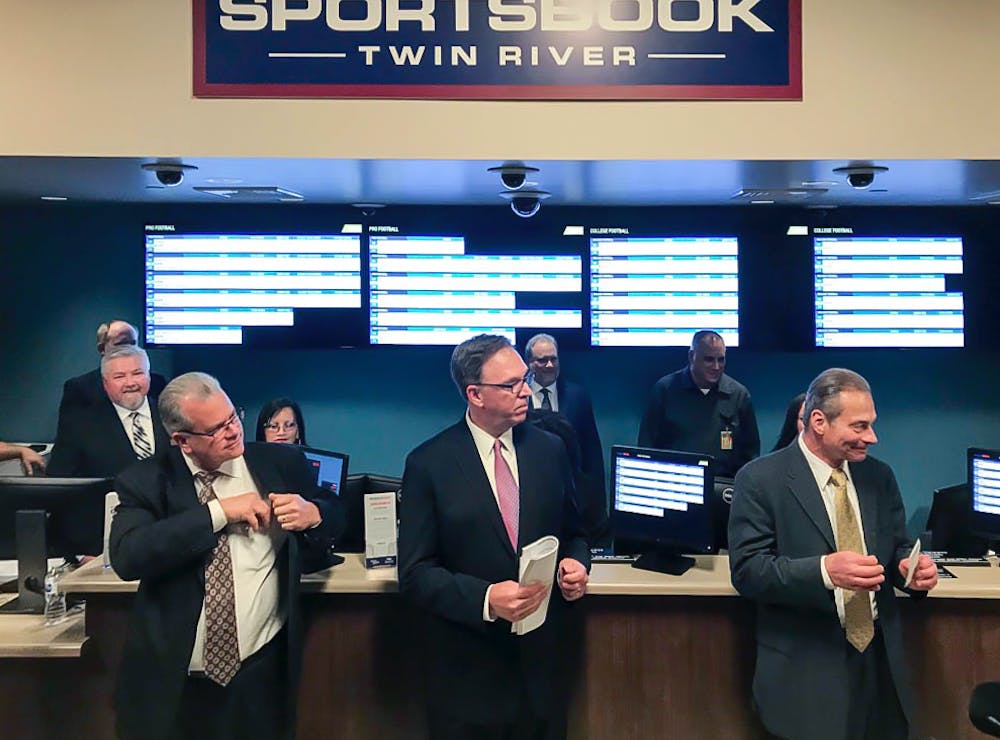Rhode Island residents and visitors can now place bets on sporting events from the comfort of their own homes, thanks to a new mobile application launched Sept. 4 by the Rhode Island Lottery. But users should not get comfortable too quickly: The state is facing a potential lawsuit claiming that the introduction of mobile sports betting is a constitutional violation.
Though sports betting was legalized by the General Assembly last year, Rhode Island’s constitution requires that an expansion of gambling be approved by a statewide referendum and a vote in individual towns and cities. Tiverton and Lincoln are the only cities in Rhode Island that voted to legalize sports betting, but the app allows people to bet on sports across the state. In order to bet on the app, users must go in person to a casino in Lincoln or Tiverton to set up an account.
According to Paul Grimaldi, chief of information and public relations for the Rhode Island Department of Revenue, the state’s legal requirement is satisfied because “the technology is located in those two places, and the bets flow through those two physical locations.”
But the lawsuit against the state, brought by psychiatrist and former Providence GOP mayoral candidate Daniel Harrop, is arguing that the mobile betting app violates an article of the Rhode Island Constitution that gives residents the right to vote on any expansion of gambling. “I just don’t think you can ignore (it) if somebody tries to take away your right to vote,” he added.
Harrop noted that he is not an opponent of gambling — in fact, he decided to bring his claim against the state while sitting at the roulette table at the Tiverton casino and describes himself as “ambivalent” on the issue of mobile sports betting.
“I do not consider this to be a case that has anything to do with betting or gambling,” Harrop said. “It’s an issue of rights and a constitutional issue.”
Harrop is also worried that the expansion of sports betting to statewide locations and private homes will cause issues for people struggling with gambling addictions. “On a snowy, icy January evening, they don’t have to get up and go to the casino to bet, they can bet from their cell phone in the comfort of their home. I think that’s going to be a big problem down the line,” Harrop said.
Harrop added that he wished there had been further discussion of the potential effects of expanding gambling, including provisions made to provide more support to compulsive gamblers.
A judge ruled Sept. 9 that Harrop did not have standing to bring this case, as he was not personally harmed by sports betting’s expansion. But after learning about the dismissal of his case, Harrop looked through his betting books and found a $20 loss from a bet on the Patriots in December at Twin River and then re-filed his case. A hearing is set for Monday to determine whether he has standing to bring this case based on his $20 loss.
“It’s not going away until the constitutional issue is decided on,” Harrop said. “We’re not going to settle for it being decided on an issue of standing, so if I don’t get standing next week, we’ll be back with another plaintiff.”
“In regards to the sports betting case status, we are reviewing it and will respond in court as appropriate,” wrote Kristy dosReis, public information officer for the Rhode Island Office of the Attorney General, in a statement to The Herald. The Attorney General’s office declined to comment further on the case, since it is representing the state in the matter.
“We’re going to follow whatever directive comes out of the court,” Grimaldi said. “We presume sports betting and the mobile app will be upheld, but we’ll have to see.”
According to Grimaldi, sports betting is expected to produce $22.7 million in revenue in FY20, with $17.3 million coming from mobile betting on the app. The state will keep 51 percent of this revenue, and the rest will be split between International Game Technology and William Hill, which helped create the app, and Twin River, the casino that operates it.
“Mobile is the way to go,” Grimaldi said. “It’s where all sorts of gaming and all sorts of products and services are being offered now. And we expect it to be popular not only for football,” he added, “but all the major sports.”
Grimaldi expects to see betting events set up around big sports games. If the Patriots make it to the Superbowl again, he said he imagines establishments near the state border might set up “some sort of party where you would draw people in from Connecticut or Massachusetts to bet legally while they’re enjoying the game,” Grimaldi said.





